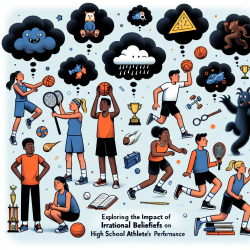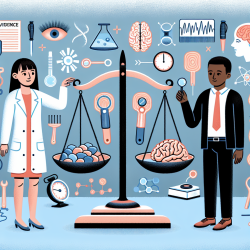Introduction
In the high-stakes world of high school athletics, student-athletes are tasked with balancing rigorous academic and athletic commitments. The study "Irrational Beliefs Among Competitive High School Student Athletes: Are they General or Context-Driven?" explores how irrational beliefs affect both academic and athletic performance in this unique population. Understanding these beliefs is crucial for practitioners aiming to enhance student-athlete outcomes.
Understanding Irrational Beliefs
Irrational beliefs, as conceptualized in Rational Emotive Behavior Therapy (REBT), are rigid and extreme thoughts that can lead to maladaptive emotions and behaviors. These beliefs can be context-specific, affecting performance in academic and athletic settings, or more general in nature.
Research Findings
The study examined 30 high school basketball players to determine whether context-specific irrational beliefs were more predictive of performance than general beliefs. Results indicated that both types of beliefs were predictive of performance, but no significant differences were found in their predictive ability.
Implications for Practitioners
For practitioners working with student-athletes, these findings suggest several actionable insights:
- Incorporate REBT Techniques: Use REBT to address irrational beliefs, focusing on both context-specific and general beliefs.
- Focus on Demandingness: Given its correlation with performance, targeting demandingness beliefs may yield significant improvements.
- Consider Individual Differences: Tailor interventions to address the specific irrational beliefs of each student-athlete.
Encouraging Further Research
While this study provides valuable insights, it also highlights the need for further research. Larger sample sizes and diverse sports settings could offer a more comprehensive understanding of how irrational beliefs impact performance.
Conclusion
Understanding and addressing irrational beliefs in student-athletes can enhance both academic and athletic performance. Practitioners are encouraged to integrate these findings into their practice and to continue exploring this area through further research.
To read the original research paper, please follow this link: Irrational Beliefs Among Competitive High School Student Athletes: Are they General or Context-Driven?










